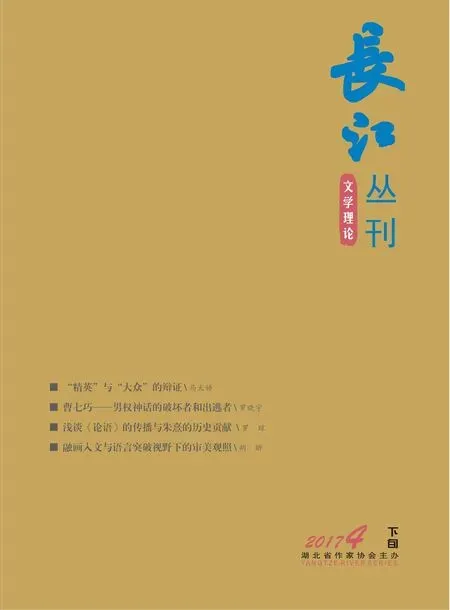Literary Translation: How to Go International
2017-12-05邹粟
邹 粟
Literary Translation: How to Go International
邹 粟
The position this paper takes is that the literary translation poses great challenges under the situation of globalization. Foreignizing Translation and Domesticating Translation should be fused in literary translation while there is cultural difference between different languages. The paper sees what was written in literal translation a starting point to encourage translators to rethink the purpose of their approach to literary translation that can contribute to making traditional Chinese cultural go international while still keep the Chinese connotation.
literal translation translation methods writer and translator;
1 Introduction
Nowadays, it has been more than 100 million US dollars in publication of exports, but some of them are not very popular in the west countries. There are several versions to explain the reasons. Generally speaking, Yang Xianyi’s The Dream In Red Mansion speaks highly of his work, but it has a big difference when it compared with Hawkes. When readers and scholars do some researches they usually chose the vision of Hawkes. The joint collection in Illinois shows that 13 universities have the version of Hawkes while only 2 universities have the version of Yang Xianyi’s.[1]
Actually, Yan Mo’s, stands for Red Sorghum, his work has an impact on Germanic tribes. Chinese Russian Literature Research Association President, Liu Wenfei, once said, Chinese Literature won’t have influence if Yan Mo didn’t won the Nobel Prize in Literature. It is not just for the litter version of translation. From a different perspective, Yan Mo’s translation problem can be the hot topic in Russia.[2]
2 How to Go International
The ending of Nobel Prize 2016 reminds people the prize of Yan Mo 2012. Frankly speaking, Yan Mo is not the best writer in Chinese history of literature, and his prize-wining works is not the best of Yan Mo. Chinese, with 5,000 years history, is rich in literature. Nowadays, the literature works has been translated into different languages around the world. The English version can be received by foreigners, but actually the works are satis fi ed the need of foreigners with the version omitted the Chinese- characteristic one.
Six factors are necessary in literary translation.
Firstly, translator is pro fi cient in two cultures. Without the understanding of cultures, translators can’t translate the works. Generally speaking, in Chinese into English translation needs more in this way translators can convey the meaning of thought, message and culture.
Secondly, to avoid translationese, writing skills play an active role in literary translation. Translator need to hone the writing ability to get to know different writing style, and to know how to write like a native speaker. Human languages are unique in comparison to other forms of communication.
Thirdly, research is needed when ones do literary translation the writer and work you are translating. Different background always confused the translators while they meet the cultural conf l ict. Varies paper or books are good to get to know the detail. Translator is supposed to give the version to several native speakers and do some survey.
Fourthly, getting to know the audience behind what you’re translating. Version is different when it comes to different group of people. Translation is fl exible when it meets the need of different audience. Ages, classes can inf l uence the work of different version.
Fifthly, there is no exact translation version. Translator is to fi nd an equivalent between different languages. Don’t get into the version seems perfectly. Sometimes translator need to correct the original book and have a discussion with the author to change the literature work if it is necessary.
Sixthly, practice is the foundation of translation. Literary translation is different from the non-literature translation. Different methods are used when someone does literary translation. Foreignizing Translation and Domesticating Translation are used during the literary translation. Translators have to choice one or mix them when the original book has cultural conf l ict.
3 Conclusion
Critically, the above factors are worth considering if Chinese culture has to go international and make some progress. There is no doubt that comparison between different versions, especially the translators from different cultural background, can compensate each other. Foreignizing Translation and Domesticating Translation can’t be independent in translation. Literary translation plays an important role in spreading culture. Seeking common ground while reserving differences is the best balance between two languages.
[1]王志勤,谢天振.中国文学文化走出去:问题与反思[J].学术月刊,2013(02):21~27.
[2]郝青.莫言作品英译文本的译介与翻译模式研究[J].武汉冶金管理干部学院学报,2016(03):81~83.
(作者单位:西华师范大学外国语学院)
